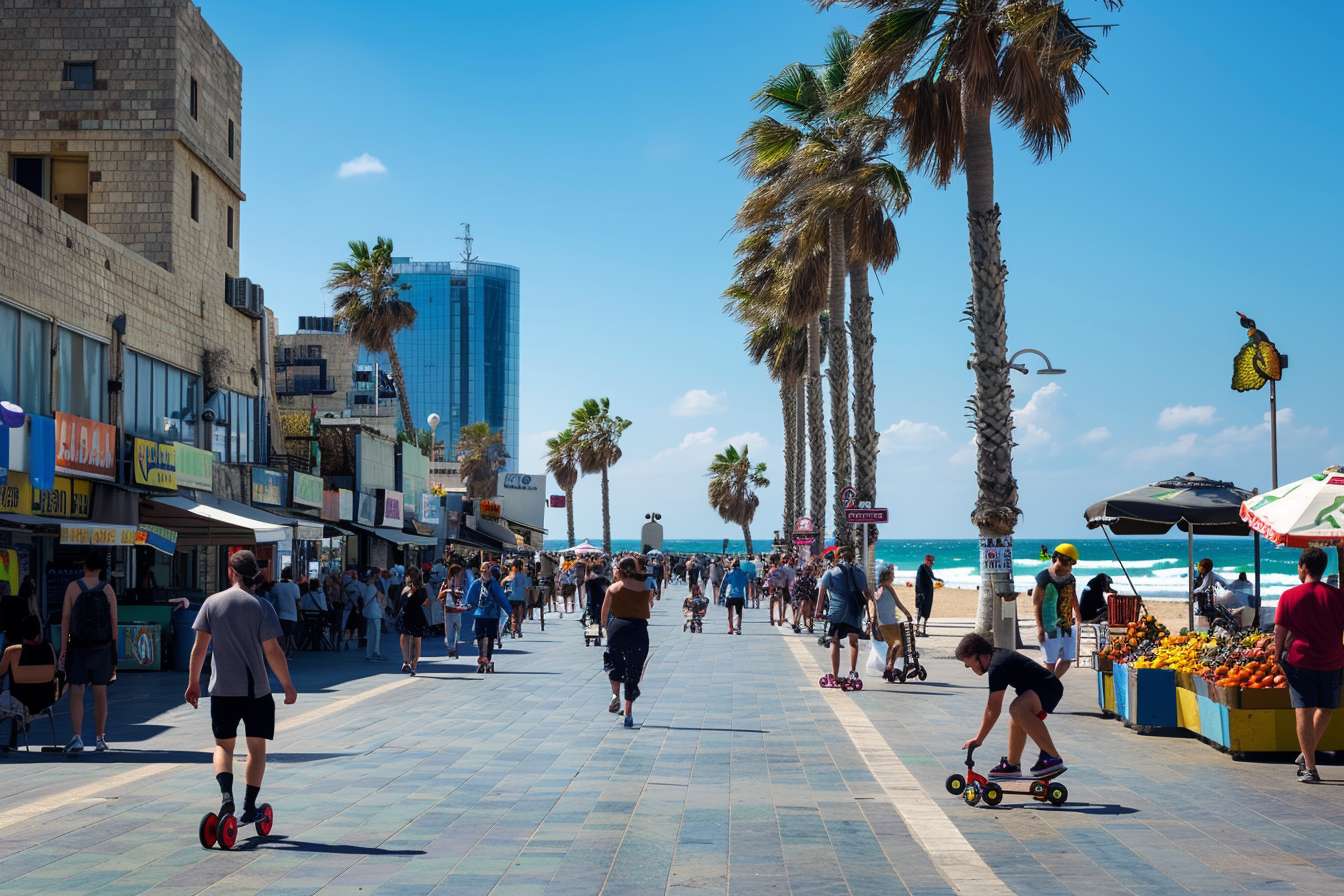In this Guide:
So, you're officially an oleh hadash—mazal tov! Now what? From rights and benefits to culture shock and coffee shop Hebrew, we’ve helped thousands navigate this exciting, chaotic, beautiful journey. Let’s break it all down and make your Israeli life smoother, smarter, and way more fun.
Key Takeaways:
- Definition: An oleh hadash is a new immigrant to Israel under the Law of Return, with legal status and benefits administered by Misrad HaKlita.
- Benefits: Includes financial aid, housing support, healthcare, tax breaks, and more — most time-limited and based on eligibility.
- Integration: You stop being an oleh hadash when life feels "normal": you're fluent in Hebrew, managing daily tasks, and integrated socially.
- Exceptions: Returning residents (like Toshav Chozer) may also qualify for some extended rights, but with different rules than first-time olim.
- Success: Strategic planning — before and after aliyah — is the biggest factor in thriving as an oleh hadash in Israel.
What is an “oleh hadash” (new immigrant) in Israel?
Definition and Legal Status
An oleh hadash (עולה חדש) is someone who’s made aliyah—immigrated to Israel—under the Law of Return. That law basically says if you’re Jewish (or have Jewish lineage), Israel’s your home. You gain legal status, a Teudat Oleh (immigration certificate), and access to benefits.
Role of the Ministry of Aliyah and Integration
Misrad HaKlita (Ministry of Aliyah and Integration) is your go-to office. They're the ones helping with benefits, housing, job support, and more. And yes, they’ll test your patience—but they mean well.
One oleh told us he went in to ask about Hebrew classes and somehow walked out with a bus card, a folder full of flyers, and an invite to a local BBQ. Welcome to Israel.
Who Qualifies?
- Jews (by religion or descent)
- Spouses of Jews
- Children/grandchildren of Jews
- Katin Chozer (returning minors)
- Toshav Chozer (returning Israeli residents)
Not the Same as...
- Toshav Chozer = Israeli who left and came back
- Residential immigrant = may not be eligible for benefits
Why is the Concept of “Oleh Hadash” Important?
Historical and Cultural Significance
Aliyah isn’t just a move—it’s a return. It’s core to Israel’s identity. Whether you’re from Brooklyn or Buenos Aires, you’re joining a global story of homecoming.
One oleh from France told us he felt like he’d stepped into a history book… until he had to queue at Misrad Hapnim. Then it was back to modern reality.
Social & Identity Shifts
Calling yourself an oleh hadash gives people context. Expect:
- Extra help (sometimes too much)
- Curious questions (“So why Israel?”)
- The occasional discount or sympathetic look at the bank
It’s a term that carries weight—both emotional and practical.
Benefits Depend on It
Your oleh hadash status is the key to unlocking benefits. Think:
- Tax breaks
- Ulpan (Hebrew language school)
- Rent subsidies
- Job seeker help
Don’t miss: How to make aliyah from the US
Also: Aliyah process explained
It’s more than just a label—it’s a launchpad. Knowing what it means can make or break your first year here.
When do you stop calling yourself an “oleh hadash”?
It’s Not a Switch, It’s a Spectrum
You stop calling yourself an oleh hadash not when the government says so, but when you feel like you belong.
Some people ditch the title in a year. Others still use it after a decade. And it’s fine either way.
One oleh said she stopped using the label after she gave directions to tourists—in Hebrew—and they actually made it to their hotel.
Common Signs You’ve “Graduated”
- You argue with customer service in Hebrew.
- You’re complaining about the Arnona like a pro.
- You’re correcting someone else’s use of b’emet and yalla.
Bureaucratic Clues
- You’ve renewed your Teudat Zehut.
- You’ve opened a bank account and no longer cry at the ATM.
- Your Kupat Cholim app finally works.
Get support: Talk to us anytime
What are the rights and benefits for an “oleh hadash”?
This is where things get exciting. Benefits can really help—but only if you know how to activate them properly.
1. Financial Assistance: Sal Klita
You’ll receive a monthly stipend (Sal Klita) for your first 6 months. To get it:
- Open an Israeli bank account fast
- Bring your Teudat Oleh and passport to Misrad HaKlita
2. Housing Support
- Rental assistance up to 5 years
- Arnona discount (municipal tax) — apply at your local city office
- Pro tip: Bring all documents twice. You’ll probably need them.
3. Healthcare Coverage
- You get free healthcare upon arrival for one year
- Choose your Kupat Cholim and register immediately
- Ulpan students are fully covered too!
Learn more: Healthcare in Israel
4. Tuition Subsidies for Higher Education
Olim under a certain age may be eligible for free or subsidized university tuition. This usually applies to Bachelor’s degrees and some Master’s programs. It’s a massive saving, especially at major institutions like Hebrew University or Tel Aviv University.
5. Youth Aliyah & School Integration Support
School-age children can receive academic support, psychological counseling, and language tutoring to help adjust to the Israeli school system. Some also get subsidies for school supplies and transportation.
6. Free Hebrew Ulpan
Olim receive free Hebrew language courses (Ulpan). Some cities offer advanced Ulpan, evening classes, or even business-focused Hebrew. Don't skip this—it sets the tone for integration.
More info here: Best way to learn Hebrew
7. Discounted Phone & Internet Plans
Many providers offer special mobile and internet plans for olim during the first year. Ask when signing up—these are rarely advertised.
8. Reduced Driver’s License Conversion Fees
Olim can convert their foreign driver’s license to an Israeli one without retaking the full test (just a practical driving test). The conversion process is subsidized and has fewer bureaucratic steps.
9.Reduced Purchase Tax on First Home
First-time olim may qualify for a reduced purchase tax (Mas Rechisha) when buying property in Israel, especially if the home is intended as a primary residence. This can mean significant savings, often tens of thousands of shekels off your first apartment.
Helpful read: Buying property in Israel
10.Education Fund for Courses & Training
Olim can access vocational training subsidies or an education fund through Misrad HaKlita. Whether it’s graphic design, tech bootcamps, or tour guiding, these programs help olim reskill or requalify for the Israeli job market.
11. Tax and Customs Breaks
- Import a car tax-free
- Discount on income tax for 3.5 years
- No customs on household goods (within 3 shipments)
12. Eligibility Rules
Benefits don’t last forever. Most expire after 12 months, some stretch to 10 years (like tax breaks). Missing deadlines = losing money.
More tips: Aliyah benefits explained
What are the challenges faced by an “oleh hadash”?
It’s not all sunshine and burekas. Here’s what trips most people up:
1. Jobs and Credentials
Finding work can be tough. Employers may not recognize your degree or experience. Tip:
- Get your credentials evaluated via Ministry of Education’s site
Also read: Employment in Israel
2. Language and Culture
Ulpan is essential, but immersion is faster.
One oleh swore he learned more Hebrew from his landlady yelling about the laundry than 3 months of class.
Tip: Practice at the local market—you’ll learn totzeret ha’aretz real fast.
3. Bureaucracy Burnout
Teudat Zehut, Arnona, Kupat Cholim… the list is endless. Our advice?
- Make photocopies of everything
- Bring snacks. And patience.
Need help? Contact us
4. Housing Market Madness
Prices are wild. Get advice before signing anything.
Useful read: Buying property in Israel
5. Identity Shift
Going from “newbie” to “local” can feel awkward. That moment when you catch yourself yelling “Slicha!” at a driver? You’re on your way.
What best practices can help new immigrants succeed?
Moving to Israel is more marathon than sprint. The most successful olim we’ve helped all had one thing in common: a plan.
Pre-Aliyah Prep
- Research everything: schools, health funds, neighborhoods, even local supermarkets
- Evaluate credentials: Use the Ministry of Aliyah’s tools
- Budget realistically: Costs can surprise you
Related: Cost of living in Tel Aviv
First 30 Days Checklist
- Open a bank account
- Sign up for Kupat Cholim
- Register at Misrad HaKlita
- Set up temporary housing or rentals
One oleh realized too late he needed an appointment just to open a bank account. Book in advance!
Community & Networking
- Join Facebook groups for olim
- Go to meetups and synagogue events
- Volunteer—it’s a great way to meet people and improve Hebrew
Explore: Things to do in Israel
Financial Management
Track benefit timelines so nothing slips through the cracks. Keep a folder just for receipts and official letters.
Long-Term Mindset
- Commit to learning Hebrew
- Set career goals for year one and beyond
- Accept that not every day will be easy, but every challenge is part of the process
Try this: Best way to learn Hebrew
How long do immigration benefits last for an “oleh hadash”?
Benefits for new immigrants aren’t forever—there’s a clock ticking on each one. Knowing when they expire helps avoid surprises.
Timeline Snapshot
- Sal Klita: Monthly payments for the first 6 months
- Healthcare coverage: Free for 12 months
- Income tax discounts: Up to 3.5 years
- Import tax exemptions: Valid for 3 years
- Rental assistance: Can extend to 5 years
It’s essential to register with Misrad HaKlita and open a bank account immediately. Many benefits won’t start until you do.
Leaving Israel Temporarily
If you leave during the first year, your benefits may pause or be lost. Returning within a year may help extend them, but rules vary.
See the official Ministry portal for updates or check with your aliyah advisor.
When It All Expires
Once your status benefits run out, it doesn't mean you're out of luck—it just means you're officially part of the Israeli system now. Plan your career, housing, and finances to align with those timelines.
Check out our guide on taxes in Israel for foreigners to make smart long-term decisions.
What documentation and legal steps are required for “oleh hadash” status?
Documentation in Israel is everything. Without the right papers, even buying a phone plan can feel like climbing Masada with no water.
Must-Have Documents
- Teudat Oleh (immigration certificate)
- Teudat Zehut (Israeli ID card)
- Israeli bank account
- Registered with Kupat Cholim (healthcare provider)
Tip: Keep all originals and copies in a folder you can take to every office. A small printer at home also saves a lot of stress.
Entry/Exit Records
The Ministry tracks when you enter and leave Israel. These records affect your eligibility for many benefits. If you travel, keep your boarding passes and passport stamps handy—yes, really.
Check out this guide from Easy Landing for more on how travel impacts status.
Other Essentials
- Convert your driver’s license within the first year
- Apply for Arnona discounts at your local municipality
- Always bring multiple forms of ID to appointments
Need help navigating bureaucracy? Our team at Native Israel can help.
What are the special cases and extended rights for returning immigrants?
Not all olim are brand-new. Some are returning Israelis, and their rights can look different.
Special Status Types
- Toshav Chozer: Israeli citizens returning after living abroad for 2+ years
- Katin Chozer: Returned as minors
- Ben Olim: Children of olim born abroad who are now immigrating
These groups may qualify for some benefits, like tax breaks or housing help, but the rules are more complex.
One Toshav Chozer told us he had to explain his army exemption three times before someone at Misrad HaKlita actually understood his status.
Returning residents need to prepare documents proving length of time abroad, like lease agreements, utility bills, and flight records.
They might not receive full “oleh hadash” perks, but there are partial rights and extensions available. Check with Misrad HaKlita or explore aliyah benefits by category.
Why is understanding your “oleh hadash” status vital for your long-term Israel life?
Your oleh hadash status is more than just a checkbox—it’s a roadmap. Understanding what it entitles you to, and when it expires, directly impacts how you plan your life in Israel.
Financial Planning
From tax breaks to rent subsidies, missing a deadline can cost you thousands. For example, one oleh forgot to register for housing benefits until month seven—too late. Bye-bye free rent.
Use a spreadsheet or reminder app to track benefit timelines. It’s a game-changer.
Check out benefits of moving to Israel for how to stretch your budget.
Career & Identity
Planning your career path around tax benefits or job-seeker support can create breathing room while you settle in. It also helps you feel like you’re building, not just surviving.
Location & Education Choices
Oleh benefits can influence where you choose to live—some areas get more support. It also impacts school subsidies, ulpan access, and more.
For a complete life plan, understanding your oleh hadash status helps you go from “new here” to “thriving local.”
And when in doubt, reach out to us at Native Israel for guidance.
Wrap Up
Being an oleh hadash is just the beginning. Whether you’re figuring out housing, jobs, or where to get great hummus, we’ve got you covered. Explore our blog, talk to us, or browse the homepage for tips, tools, and real support—wherever you are in your journey.
Related Posts
Discover more about life in Israel! Our related posts cover aliyah, culture, and where to live—everything you need to know about Israel.
Sign Up for our Newsletter
Enter your email to receive the latest news and updates.







